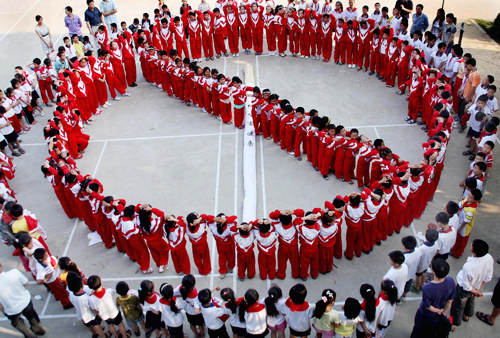|
 |
|
NO SMOKING: Students in a primary school in Dexing, Jiangxi Province, attend an activity commemorating World No Tobacco Day (CFP) |
A landmark statue similar to the Chinese Pavilion of the 2010 World Expo in Shanghai appeared on a street in Beijing. The government of the Chaoyang District where the statue is located says that it is a landmark statue of the district, but the public thinks this statue can by no means reflect local features.
Setting up a landmark statue will improve the public environment in the area. The question is, this statue was built up without asking the public's opinions and is suspected of copying the Chinese Pavilion of the 2010 World Expo in Shanghai. Instead of upgrading the area's cultural image, it has a negative impact on it.
The construction of urban statues should be based on public opinion, because such statues are visual artwork. Besides, since such constructions are usually very expensive, they are not supposed to be set up arbitrarily.
Architecture in public areas should always put cultural and aesthetic values first. If they are designed as landmarks the architecture must be of certain aesthetic values, and are never simply a signpost. The bottom line is: No copying of other artistic architecture.
We hope that each construction of a landmark structure will be seriously treated and can make a special contribution to the city's aesthetic value.
The Beijing News
Peking University recently announced a tobacco control regulation which forbids selling cigarettes on campus. Teachers and students who have been found smoking in non-smoking areas three times will also be punished to some extent. Many other universities in Beijing are following Peking University's practice. Although China signed the World Health Organization Framework Convention on Tobacco Control in 2005, the number of smokers has not declined remarkably and more and more non-smokers have become victims to second-hand smoke.
Due to the lack of effective supervision, despite the university's smoking control regulations, students are still widely found smoking indoors. Of the 61 colleges in Beijing that have been surveyed, 88.52 percent of them have cigarette stubs in school rooms.
It's true that smoking control mainly depends on individuals' awareness of the danger of smoking, but if there are no strict measures, it will be even more difficult to discourage people from smoking. For example, smoking is forbidden inside the Beijing Capital International Airport, so if someone smokes in such a non-smoking area, the smoker will feel embarrassed. In this sense, to eliminate smoking it's important to create an environment that rejects cigarettes, instead of aiming at punishment.
Given the fact that many people pick up the habit of smoking in colleges, it's important to take measures to reduce new smokers on the campus. We can't expect to see a sharp decrease of smokers overnight, but strict regulations will help to create a hostile atmosphere to smoking, so that smokers will choose not to smoke in public areas.
Beijing Times
Zhong Chengxiang, former Vice Chairman of the China Federation of Literary and Art Circles, said at a recent symposium that audience ratings have been overemphasized when it comes to play writing or TV channels' program arrangement.
If movies, TV series and entertainment programs overstress profits and treat cultural and artistic products simply as ordinary commodities, then the audience ratings will easily become the only target of all artistic creation. In a market economy it's alright to expand the profit margins, but even ordinary commodities have to obey the basic moral standards, let alone cultural products. If TV series are filled with violence, sex and various pictures to excite people's sensory systems, they will pollute the whole society's cultural environment.
The audience rating is by no means the only criterion to measure a movie or a TV series' value. TV programs do need a certain viewership rate, but they must be based on high moral and artistic levels. Nowadays, TV programs have an extensive influence throughout the society. Thus, playwriters and TV grogram producers must be careful and responsible in art creation and program broadcasting. While paying attention to the audience ratings, they should also remember their social responsibilities.
People's Daily
The State Council Information Office of China announced on December 13 that government officials' performance assessments will cover their work on curbing infringement cases and fake commodities. The public will also be rewarded if they report on infringement and fake cases.
Copyright and patent infringement and fake commodities have been rampant in recent years. It's partly because of some businesses' negligence of laws and regulations, but meanwhile, it's also a result of governmental departments' inaction and malpractice.
Now, since officials' performance assessment covers achievements in fighting against fake commodities, those officials who turn a blind eye to rampant infringement cases or improperly deal with the situation will suffer from the loss of promotion or even punishment.
The new performance assessment shows the Chinese Government's determination to crack down on fake products. Nevertheless, this is not enough. There must be certain mechanisms to let governmental departments implement their duties and empower the public to supervise these departments' behaviors and actions.
Zhujiang Evening News | 